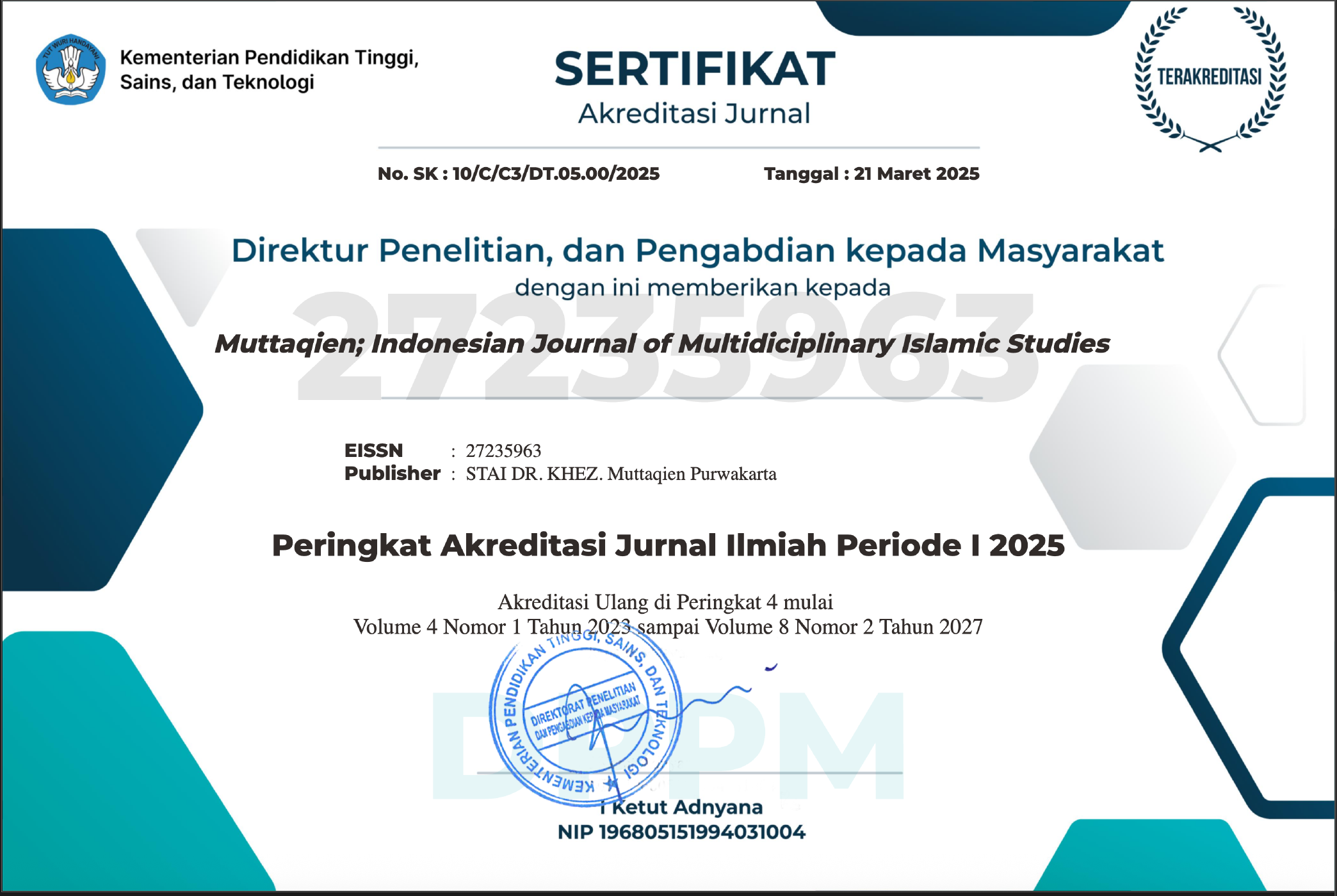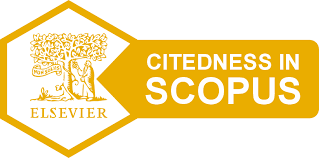Integrasi Pendidikan Islam Berbasis Ilmu Sosial Profetik dalam Penguatan Keberagamaan Mahasiswa
Keywords:
Prophetic Social Sciences, Islamic education, Integration, ReligiousAbstract
This research is based on integrating Islamic values through contemporary social theory to improve the degree of religious students in educational and learning activities in universities. This study aims to determine the paradigm foundation, essence, and relations of humanization, liberation, and transcendence of Kuntowijoyo's prophetic social sciences in Islamic education. The research was conducted using literature studies using a socio-historical philosophical approach. The data were obtained from several kinds of literature, adapted by direct and indirect quotation techniques, and then processed and analyzed with intelligent analysis methods in the three domains of Kuntowijoyo's prophetic social sciences, namely humanization ('Amar ma'rūf), liberation (nahyī munkar), and transcendence. The results showed that prophetic social science is a choice in the scientific discourse of Islamic socio-cultural formats that are interesting to be developed by Muslims in general, as well as the academic community of universities as part of academia. This is because Islamic education that develops is not only a process of instilling moral values and fortifying harmful access but also how these moral values are instilled able to act as Islamic forces to get out of poverty, ignorance, and social and cultural backwardness.
References
Effendi, M. R. (2021). Teologi Islam; Potret Sejarah dan Perkembangan Mazhab Kalam. Literasi Nusantara.
Hamruni. (2008). Konsep Edutainment dalam Pendidikan Islam. Bidang Akademik UIN Sunan Kalijaga.
Hastono. (1999). Perkembangan Peserta Didik. Rineka Cipta.
Hidayat, K. (1987). Upaya Pembebasan Manusia; Tinjauan Sufistik Terhadap Manusia Moderen Menurut Hossein Nasr, dalam Dawam Raharjo (peny.), Insan Kamil; Konsepsi Manusia Menurut Islam. Jakarta: Pustaka Grafity Pers.
Kuntowijoyo. (1999). Paradigma Islam: Interpretasi Untuk Aksi. Mizan.
Mudzakar, A. M. dan Y. (2006). Ilmu Pendidikan Islam. Kencana Prenada Media Group.
Muhamad Ridwan Effendi, Firdaus Wajdi, Izzatul Mardhiah, Sa’dullah, Naila Fathiya Salsabila, N. A. J. (2022). Strengthening the Prophetic Values of the Cisaat Village Community in Religious Education Activities through the Muslim Friendly Tourism Program. Sivitas : Jurnal Pengabdian Dan Pemberdayaan Masyarakat, 2(2). https://e-jurnal.staimuttaqien.ac.id/index.php/sivitas/article/view/795
Muhamad Ridwan Effendi, Rudi M. Barnansyah, S. N. (2019). Model Pendidikan Inklusif Pondok Pesantren. Laboratorium PAI FIS UNJ. https://seminars.unj.ac.id/icic/
Muslih, M. (2002). Pendidikan Karakter: Menjawab Tantangan Multidimensional. Bumi Aksara.
Mustafa, M. (2010). Dakwah Sufisme Syekh Yusuf al-Makassary. Pustaka Pelajar.
Nata, A. (2014). Sosiologi Pendidikan Islam. Rajawali Press.
Nizar, S. (2002). Filsafat Pendidikan Islam: Pendekatan Historis, Teoritis dan Praktis. Ciputat Press.
Nurpratiwi, M. R. E. dan S. (2021). Hubungan Keberagamaan dan Perilaku Altruistik Mahasiswa. Al-Afkar, 4(1), 83–97. https://doi.org/https://doi.org/10.31943/afkarjournal.v4i1.181
Praja, T. S. (2021). Relevansi Pendidikan Islam Berbasis Ilmu Sosial Profetik Terhadap Pengembangan Kurikulum 2013 Madrasah. Mudir: Jurnal Manajemen Pendidikan, 3(2), 73.
Sugiyono. (2015). Metode Penelitian Pendidikan Pendekatan Kuantitatif, Kualitatif Dan R&D. Alfabeta.
Zuhairi. (1977). Metodik Khusus Pendidikan Agama. Usaha Nasional.
Published
How to Cite
Issue
Section
Copyright (c) 2023 Muttaqien; Indonesian Journal of Multidiciplinary Islamic Studies

This work is licensed under a Creative Commons Attribution-ShareAlike 4.0 International License.
Muttaqien; Indonesian Journal of Multidiciplinary Islamic Studies allow the author(s) to hold the copyright without restrictions and allow the author(s) to retain publishing rights without restrictions and authors who publish with this journal agree to the following terms:
In developing strategy and setting priorities, Muttaqien; Indonesian Journal of Multidiciplinary Islamic Studies recognize that free access is better than priced access, libre access is better than free access, and libre under CC-BY-SA or the equivalent is better than libre under more restrictive open licenses. We should achieve what we can when we can. We should not delay achieving free in order to achieve libre, and we should not stop with free when we can achieve libre.
Muttaqien; Indonesian Journal of Multidiciplinary Islamic Studies has a CC-BY SA license or its equivalent as the optimal license for publication, distribution, use and reuse of scientific work. This license is under a Creative Commons Attribution 4.0 International License.
You are free to:
- Share — copy and redistribute the material in any medium or format
- Adapt — remix, transform, and build upon the material for any purpose, even commercially.
- The licensor cannot revoke these freedoms as long as you follow the license terms.











